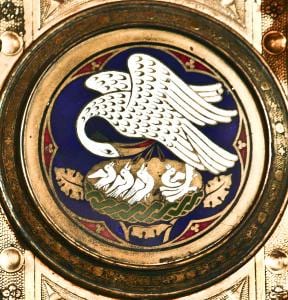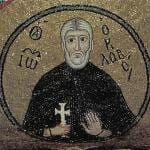
Good does not need evil, but evil needs the good, for goodness is ontologically connected to being itself. What exists, in its existence, is good. Evil thrives on the good; it uses and abuses the good, distorting and corrupting it, so that as evil feeds on the good, it weakens and lessens it. If evil were not stopped, it would prove to be self-destructive, for it would destroy the good through its corruption, and once the good was destroyed, evil would have no host for itself and it would too vanish with the elimination of the good.
Those who overcome evil know the destructive power of evil. They know the pain and suffering it brings. Evil, however, is not embraced in and of itself. Everyone looks after and seeks some sort of good which evil attaches itself to like a poison pill. Evil takes that good, however limited it is, and uses it to give to the person who embraces it temporary pleasure and joy, but because the good is slowly eliminated by the evil, the joy does not last. Eventually whatever happiness one has achieved through evil is gone; then all those who have attached themselves to such evil will find only pain and sorrow.
Those who have seen through some evil, those who have overcome some evil, see and know the true good which the evil tried to imitate, and find the joy of that good and experience it in a way which they previously could not. For once they have broken through the deceit of evil, through its illusions, they not only experience the good which they sought, but they have added to it the joy of relief. Only those who have suffered some particular pain and sorrow will experience the happiness available once such suffering has been overcome.
Because evil attaches itself to some good in order to exist, that good proves to be evil’s weakness. For the good which evil tries to use for its own end can be used against the evil itself, for the good can reveal itself in its integrity and suggest we follow it rather than its pale imitation. If embraced, that good which was corrupted by evil can find its integrity restored as the evil itself is overcome. And then, once such an evil has truly been defeated through the good which it tried to corrupt, that good finds itself with a vitality which it did not have before as it has become vaccinated, as it were, against the viral attack of evil and can resist it with its newfound strength.
Thus, if we say that there is a good which is had only after the good overcomes its opposition, that is an evil, we must not believe this means that the good needs evil, for it does not. But this is not to say that the good cannot find itself and make itself grater through such opposition. It does. Thus, the potential for evil is not needed for the good, but the fight against evil allows the good to become more than it was if it did not fight and overcome such evil. Evil not only finds itself being defeated by the good which it tried to corrupt, but it finds in such a defeat, it makes the good greater than before, so that truly, a greater good can be had after the fight against evil than before.
In the incarnation, the Logos enters into creation to overcome the evil of sin. The Logos sees all the good which evil has taken unto itself, and detaches that good from the evil, so that the good can then be taken into the Logos and given all it needs for it to be restored to its original integrity before being made greater through the deifying grace which the Logos give to it from its own being. In and through the Logos, the good truly overcomes evil, and through the Logos, we find a good which we did not know before Christ’s victory over death. Thus Julian of Norwich explains:
And we have all this bliss by mercy and grace, and this kind of bliss we never could have had known, unless that property of goodness which is in God had been opposed, through which we have this bliss. For wickedness has been suffered to rise in opposition to that goodness; and the goodness of mercy and grace opposed that wickedness and turning everything to goodness and honour for all who will be saved. For this is that property in God which opposes good to evil. So Jesus Christ, who opposes good to evil, is our true Mother. We have our being from him, where the foundation of motherhood begins, and with all the sweet protection of love which endlessly follows.[1]
The descent of the Logos into creation, the incarnation, has the good God and Savior Jesus Christ come into the world in order to oppose evil and overcome it from within. The work of the Savior can be described as the work of motherhood, as Jesus gives birth to our salvation on the cross; the pains which Jesus suffered are like labor pains, willingly taken on out of love so that Jesus’ children, us, can arise in the world and find our place in the kingdom of God. Mercy and grace are ours thanks to Christ’s labor, and through them, we can know bliss; but in doing so, we should look up to Christ, the Mother of our Salvation, and realize it is only through Christ, and not apart from Christ, that the evil of sin is vanquished and salvation is possible. Our sins have us embrace evil, but Christ, our loving mother, washes us and makes us clean. Christ takes what is defiled by sin and cleanses it with tender-loving care, so that the inner, radiant goodness can once again be manifest, even as it is strengthened by the loving milk of our Savior, the blood which was shed for us, which we now eat and drink from the breast of Christ.
Julian considered it important to realize God is both Father and Mother, and in doing so, considered the revelation of the motherhood of God is found especially in the Logos, for in the incarnation, God works like a loving mother, bringing us home:
Our Great Father, almighty God, who is being, knows us and loved us before time began. Out of this knowledge, in his most wonderful deep love, by the prescient eternal counsel of all the blessed Trinity, he wanted the second person to become our Mother, our brother and our saviour. From this is follows that as truly as God is our Father, so truly is God our Mother. Our Father wills, Our Mother works, our good Lord the Holy Spirit confirms. And therefore it is our part to love our God in whom we have our being, reverently thanking and praising him for our creation, mightily praying to our Mother for mercy and pity, and to our Lord the Holy Spirit for help and grace. [2]
We, who have received mercy and grace, we who have seen the way God overcomes evil from opposing it from within so that the good, should look to Christ. We should see the work Christ did for shows us how Christ truly is our loving Mother; Christ bore us all to fruition on the cross, so that we can truly be born again and made into children of God. We should follow after Christ in opposing evil so as to free the good which is in its clutches, realizing by doing so, we will help the good become greater than before. Good does not need evil, but it can grow in strength by opposing evil and overcoming it. The more good overcomes less, the less and less room there will be for evil to grab ahold of it and destroy it. Eventually, the good will no longer be able to be grasped at by evil and evil itself will be entirely overcome, so that in the eschatological kingdom of God, God will be all in all, and all will indeed be well.
[1] Julian of Norwich, The Showings. Trans. Edmund Colledge, OSA and James Walsh, SJ (New York: Paulist Press, 1978), 295[Long text].
[2] Julian of Norwich, The Showings, 296[Long text].
Stay in touch! Like A Little Bit of Nothing on Facebook.
If you liked what you read, please consider sharing it with your friends and family!













